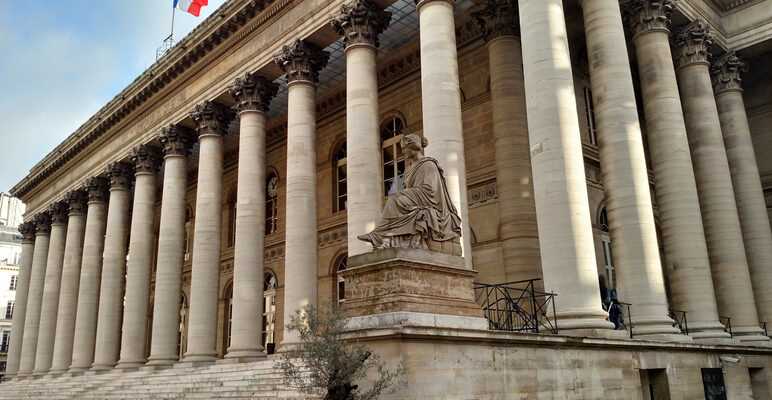The Paris Stock Exchange ends this week shortened by the Easter weekend on a slight gain after the status quo of the European Central Bank on its interest rates. The ECB confirmed in a press release that it intended to end its asset purchase program (APP) in the third quarter, without further details. The absence of a horizon for real monetary tightening explains the rise in European markets on Thursday, while the American indices are down overall. On the other hand, on the foreign exchange market, the reaction is the opposite: the euro, down 1%, fell below the bar of 1.08 dollars, its lowest level since May 2020.
The Cac 40 closed the session with a gain of 0.72% to 6,589.35 points. Investors have limited initiatives, however, as the stock market will be closed tomorrow, Good Friday, and Easter Monday.
“At the beginning or at the end”
During the traditional press conference which followed the meeting of European central bankers, Christine Lagarde, President of the ECB, was not more specific this afternoon, contenting herself with indicating that the purchase program of assets should probably stop “at the beginning or end of the third trimester”, the debate remaining open within the Board of Governors. As for the question of a rate hike, it would come some time after the end of the APP, according to the ECB statement, a notion which implies “a period of one week to several months”reported the President of the ECB in response to a question.
More generally, Christine Lagarde, more accustomed to lowering the stock market than raising it with her statements, warned that the war in Ukraine was weighing heavily on confidence and that the rise in energy prices was affecting demand. and production. As a result, growth remained weak in the first quarter, and will remain slow in the coming months as downside risks to growth have increased significantly. Inflation risks, meanwhile, have risen substantially and early signs that inflation expectations are overshooting the target should be watched.
Economists are now waiting for the June meeting and the new economic projections from the ECB to find out more.
Elsewhere, the trend is to tighten
The trend is generally towards monetary tightening, whether in the United States, Canada, Brazil, New Zealand and, more recently, in South Korea and Singapore. The Fed has already raised interest rates by a quarter of a point to fight inflation and is preparing to raise them by half a point in May and June.
In March, the rise in consumer prices in the United States fell in “core” data, which excludes the volatile evolution of food and energy, which gives hope that inflation has peaked. Or rather, gave hope. Because yesterday, with the release of the Producer Price Index, showing a historic runaway in costs (the PPI rose 11.2% in March), economists are no longer so sure that consumer prices are not going to progress any further.
Contrary to the general trend, the Chinese authorities for their part clearly hinted yesterday that they were considering measures to support activity, which could involve a reduction in the rate of compulsory reserves for the large banks in order to revive an economy. weakened by the recontainments due to the outbreak of Covid-19 infections.
Hermès on the rise, Nike supports the Dow Jones
On Wall Street, the Nasdaq index of technology stocks, which has the most to lose from the rise in interest rates, lost 1%, even though stocks Twitter are wanted, while Elon Musk offers to buy the social network for 43 billion dollars (You’re here on the other hand loses more than 3%). The S&P 500 is also down, while the Dow Jones is up 0.4%, supported in particular by the rise of more than 5% in Nike, the bank UBS strongly recommending to buy the shares of the sports equipment manufacturer. On Wall Street, we will also note the progress of the banks Goldman Sachs, Morgan Stanley and Citigroup after the publication of their quarterly accounts, while Wells Fargo, which also made its copy, dropped more than 6%.
On this side of the Atlantic, Hermes (+2.7%) reported sales growth of more than 30% in the first quarter, much higher than expected by analysts. Earlier this week, LVMH (+0.9%) had already beaten market expectations.
Publicis gained 1.8% after a highly volatile session. The advertising group reported organic growth of 10.5% in the first quarter, beating analysts’ expectations, but did not raise its forecast for the full year due to economic uncertainties.
Biggest increase in the Cac 40, EssilorLuxottica closed with a gain of more than 3%. Morgan Stanley raised its target price from 190 to 195 euros while maintaining its opinion to “overweight”.
